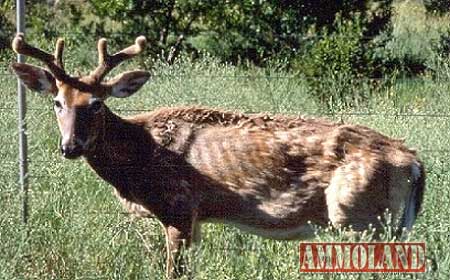

LANSING, Mich. -(Ammoland.com)- Chronic wasting disease was confirmed this week in two female deer from a Mecosta County deer farm. CWD is a fatal neurological disease that affects white-tailed deer, mule deer, elk and moose.
This is the second time the disease has been found in a farmed deer facility in Michigan. In 2008, a white-tailed deer from a Kent County deer farm tested positive.
“Chronic wasting disease is a serious disease affecting both farmed and free-ranging deer,” said MDARD State Veterinarian James Averill, DVM. “We are following the state’s CWD response plan and taking the necessary steps to protect the health and well-being of all of Michigan’s deer populations.”
Samples from the two deer were submitted for testing as a part of MDARD’s mandatory CWD surveillance program. All farmed deer facilities licensed with the Michigan Department Natural Resources must participate in this program.
“Any discovery of chronic wasting disease in free-ranging or farmed deer is disappointing,” said Chad Stewart, DNR deer and elk specialist. “It will take significant time and effort – through immediate, targeted surveillance and mandatory checks during the upcoming deer seasons – to understand the current situation. The Michigan DNR remains committed in our efforts to contain this disease and safeguard our valuable wildlife resource.”
MDARD and DNR are implementing the Michigan Surveillance and Response Plan for Chronic Wasting Disease of Free-Ranging and Privately Owned Cervids, and are taking the following steps:
- Quarantine the affected farm.
- Complete trace investigations to identify the potential sources of infection and possible areas of spread.
- Work with the producer to depopulate the facility.
- Test all deer from the affected herd for CWD.
- Identify all other deer farms in a 15-mile radius, which will undergo a records audit, fence inspection and increased surveillance testing.
- Conduct targeted surveillance testing on free-ranging white-tailed deer near the facility.
- Have mandatory deer check for hunter-harvested deer in a nine-township area.
An informational meeting for deer farmers is scheduled for:
Wednesday, February 1, 2017, at 7 p.m.
Big Rapids Holiday Inn
1005 Perry Avenue, Big Rapids, Michigan 49307
In May 2015, CWD was found in a free-ranging deer in Ingham County. Since then, the DNR has tested nearly 12,000 free-ranging deer for CWD; nine deer have tested positive in Ingham and Clinton counties.
CWD is transmitted directly from one animal to another and indirectly through the environment. Infected animals may display abnormal behavior, progressive weight loss and physical debilitation.
To date, there is no evidence that CWD presents any risk to humans or other animals outside the deer family, either through contact with an infected deer or from handling venison that came from a CWD-infected deer.
However, as a precaution, the U.S. Centers for Disease Control and the World Health Organization recommend that infected animals not be consumed as food by either humans or domestic animals.
More information about CWD – including Michigan’s CWD surveillance and response plan – is available on their website.
